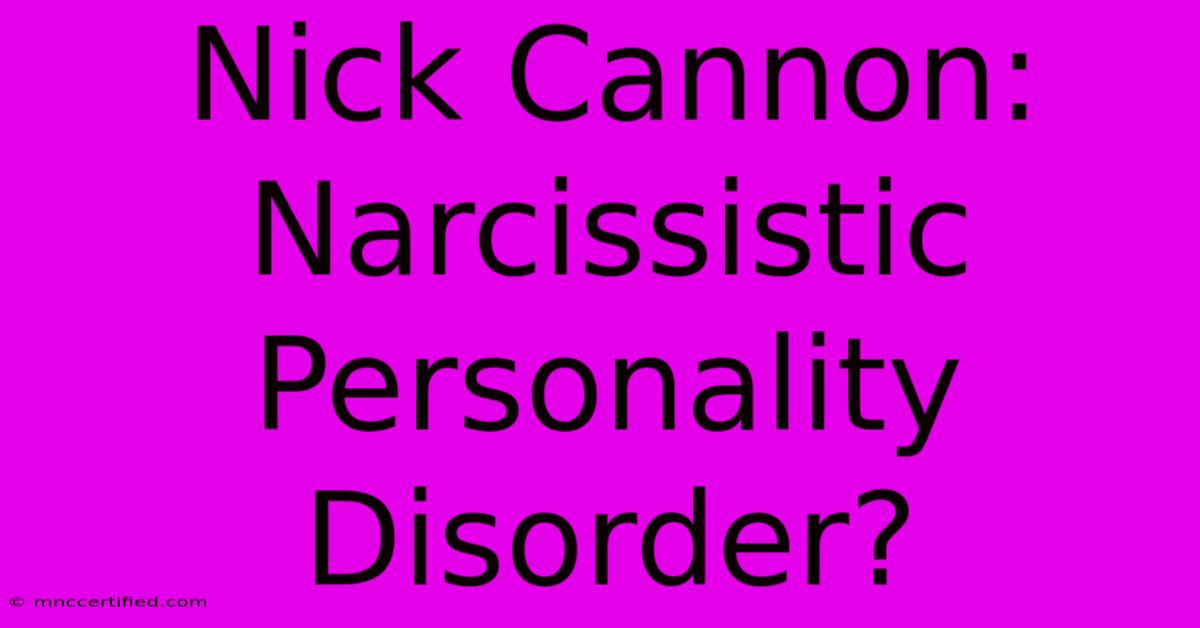Nick Cannon: Narcissistic Personality Disorder?

Table of Contents
Nick Cannon: Narcissistic Personality Disorder? Exploring the Speculation
Nick Cannon, a multifaceted entertainer known for his career as a rapper, actor, comedian, and television host, has often been the subject of public scrutiny. Recently, speculation regarding a potential Narcissistic Personality Disorder (NPD) diagnosis has circulated online. This article aims to explore this speculation responsibly, examining the behaviors often associated with NPD and how they might relate to Cannon's public persona, while emphasizing that this analysis is not a professional diagnosis. It's crucial to remember that diagnosing a personality disorder requires a comprehensive evaluation by a qualified mental health professional.
Understanding Narcissistic Personality Disorder
Narcissistic Personality Disorder is a complex personality disorder characterized by a pervasive pattern of grandiosity (in fantasy or behavior), need for admiration, and lack of empathy. Individuals with NPD often exhibit several key traits, including:
- Grandiosity: An inflated sense of self-importance, often exaggerating achievements and talents.
- Need for Admiration: Requires excessive admiration and attention, often becoming preoccupied with fantasies of unlimited success, power, brilliance, beauty, or ideal love.
- Lack of Empathy: Shows a remarkable lack of understanding or concern for the feelings and needs of others.
- Arrogance: Behaves in an arrogant or haughty manner, believing they are superior to others.
- Entitlement: Feels entitled to special favors or uncritical compliance with their expectations.
- Exploitation: Takes advantage of others to achieve their own ends.
- Interpersonal Relationships: Has unstable and turbulent relationships, marked by intense highs and lows, often characterized by manipulation and control.
Nick Cannon's Public Persona and the Speculation
Many aspects of Nick Cannon's public life have fueled discussions about his personality. Some point to his numerous children with different partners, his outspoken nature, and his business ventures as potential indicators of narcissistic traits. However, it’s vital to contextualize these observations:
-
High-Profile Relationships: The sheer number of Cannon's relationships and children has prompted significant public commentary. Some interpret this as evidence of a need for admiration and validation, possibly indicative of a lack of empathy. Others argue that his relationships, while numerous, might simply reflect his personal choices.
-
Public Statements and Controversies: Cannon’s sometimes controversial statements and actions have drawn criticism. While some might interpret these as arrogant or lacking empathy, it's important to consider the potential for misinterpretations or the complexities of his public image.
-
Entrepreneurial Pursuits: Cannon's diverse career demonstrates ambition and drive. Some see this as evidence of grandiosity and a desire for success, while others consider it a testament to his hard work and entrepreneurial spirit.
The Importance of Context and Nuance
It's imperative to approach this discussion with caution and avoid making hasty judgments. Public perception is often incomplete and influenced by media portrayal and selective information. Observing behavior in public settings does not constitute a professional psychological evaluation. Cannon's actions might be interpreted differently depending on individual perspectives and biases. Attributing a personality disorder based on limited public information is not only irresponsible but also potentially harmful.
Conclusion: Avoiding Labeling and Seeking Professional Help
While some of Nick Cannon's behaviors might align with certain characteristics associated with NPD, it's impossible to offer a diagnosis based solely on public observation. Labeling someone with a personality disorder without proper clinical assessment is unethical and inaccurate. If you are concerned about your own behavior or that of someone you know, it is crucial to seek professional help from a qualified mental health professional for a proper evaluation and diagnosis. Understanding personality disorders requires a nuanced and empathetic approach, avoiding the pitfalls of armchair diagnoses based on incomplete information. This discussion serves as a reminder of the importance of responsible engagement with mental health discussions and the respect for individual privacy and professional expertise.

Thank you for visiting our website wich cover about Nick Cannon: Narcissistic Personality Disorder?. We hope the information provided has been useful to you. Feel free to contact us if you have any questions or need further assistance. See you next time and dont miss to bookmark.
Featured Posts
-
Assisted Dying Bill Whats Next
Nov 30, 2024
-
Coronation Street Killer Identity Exposed
Nov 30, 2024
-
Maryland Resin Bonded Bridge
Nov 30, 2024
-
Western Asset Core Bond Fund
Nov 30, 2024
-
Brighton Vs Southampton Predicted Starting Xi
Nov 30, 2024